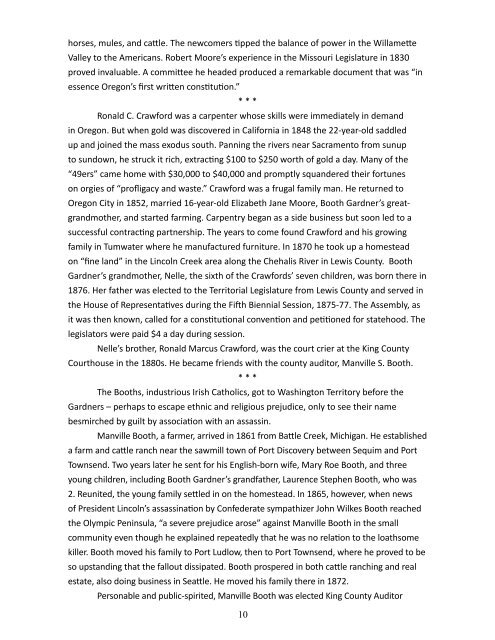booth gardner - Washington Secretary of State
booth gardner - Washington Secretary of State
booth gardner - Washington Secretary of State
Create successful ePaper yourself
Turn your PDF publications into a flip-book with our unique Google optimized e-Paper software.
horses, mules, and cattle. The newcomers tipped the balance <strong>of</strong> power in the Willamette<br />
Valley to the Americans. Robert Moore’s experience in the Missouri Legislature in 1830<br />
proved invaluable. A committee he headed produced a remarkable document that was “in<br />
essence Oregon’s first written constitution.”<br />
* * *<br />
Ronald C. Crawford was a carpenter whose skills were immediately in demand<br />
in Oregon. But when gold was discovered in California in 1848 the 22-year-old saddled<br />
up and joined the mass exodus south. Panning the rivers near Sacramento from sunup<br />
to sundown, he struck it rich, extracting $100 to $250 worth <strong>of</strong> gold a day. Many <strong>of</strong> the<br />
“49ers” came home with $30,000 to $40,000 and promptly squandered their fortunes<br />
on orgies <strong>of</strong> “pr<strong>of</strong>ligacy and waste.” Crawford was a frugal family man. He returned to<br />
Oregon City in 1852, married 16-year-old Elizabeth Jane Moore, Booth Gardner’s greatgrandmother,<br />
and started farming. Carpentry began as a side business but soon led to a<br />
successful contracting partnership. The years to come found Crawford and his growing<br />
family in Tumwater where he manufactured furniture. In 1870 he took up a homestead<br />
on “fine land” in the Lincoln Creek area along the Chehalis River in Lewis County. Booth<br />
Gardner’s grandmother, Nelle, the sixth <strong>of</strong> the Crawfords’ seven children, was born there in<br />
1876. Her father was elected to the Territorial Legislature from Lewis County and served in<br />
the House <strong>of</strong> Representatives during the Fifth Biennial Session, 1875-77. The Assembly, as<br />
it was then known, called for a constitutional convention and petitioned for statehood. The<br />
legislators were paid $4 a day during session.<br />
Nelle’s brother, Ronald Marcus Crawford, was the court crier at the King County<br />
Courthouse in the 1880s. He became friends with the county auditor, Manville S. Booth.<br />
* * *<br />
The Booths, industrious Irish Catholics, got to <strong>Washington</strong> Territory before the<br />
Gardners – perhaps to escape ethnic and religious prejudice, only to see their name<br />
besmirched by guilt by association with an assassin.<br />
Manville Booth, a farmer, arrived in 1861 from Battle Creek, Michigan. He established<br />
a farm and cattle ranch near the sawmill town <strong>of</strong> Port Discovery between Sequim and Port<br />
Townsend. Two years later he sent for his English-born wife, Mary Roe Booth, and three<br />
young children, including Booth Gardner’s grandfather, Laurence Stephen Booth, who was<br />
2. Reunited, the young family settled in on the homestead. In 1865, however, when news<br />
<strong>of</strong> President Lincoln’s assassination by Confederate sympathizer John Wilkes Booth reached<br />
the Olympic Peninsula, “a severe prejudice arose” against Manville Booth in the small<br />
community even though he explained repeatedly that he was no relation to the loathsome<br />
killer. Booth moved his family to Port Ludlow, then to Port Townsend, where he proved to be<br />
so upstanding that the fallout dissipated. Booth prospered in both cattle ranching and real<br />
estate, also doing business in Seattle. He moved his family there in 1872.<br />
Personable and public-spirited, Manville Booth was elected King County Auditor<br />
10

















